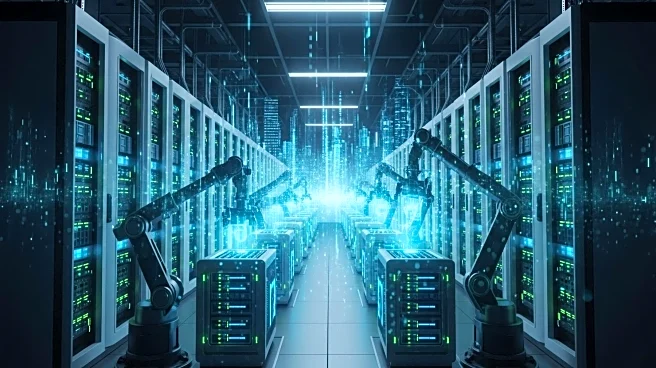What's Happening?
Nvidia has announced a significant partnership with OpenAI, committing up to $100 billion to develop 10 gigawatts of AI computing power. This investment will be used to build AI data centers, with the first gigawatt expected to be operational by late 2026 on Nvidia's new 'Vera Rubin' supercomputer. This collaboration aims to enhance AI capabilities and meet the growing demand for AI chips. Nvidia's CEO, Jensen Huang, described this as a major step forward in AI development, while OpenAI's Sam Altman emphasized the importance of computing power in driving AI advancements. This partnership highlights the increasing integration of AI technologies in various sectors.
Why It's Important?
The partnership between Nvidia and OpenAI is a significant development in the AI industry, as it underscores the growing demand for advanced computing power to support AI innovations. This investment is expected to accelerate AI research and development, potentially leading to breakthroughs in various fields such as healthcare, finance, and technology. The collaboration also strengthens the ties between Nvidia and OpenAI, positioning them as key players in the AI market. As AI continues to evolve, this partnership could have far-reaching implications for industries that rely on AI technologies, offering new opportunities for growth and innovation.
What's Next?
The deployment of the first gigawatt of AI computing power is scheduled for late 2026, marking the beginning of a new era in AI development. As Nvidia and OpenAI work together to build these data centers, other tech companies may also increase their investments in AI infrastructure to remain competitive. This could lead to a surge in AI-driven innovations and applications across various sectors. Additionally, the partnership may prompt regulatory bodies to closely monitor the development and deployment of AI technologies to ensure ethical and responsible use.
Beyond the Headlines
The collaboration between Nvidia and OpenAI raises important questions about the ethical implications of AI development. As AI technologies become more integrated into everyday life, concerns about data privacy, security, and the potential for misuse will need to be addressed. This partnership also highlights the need for a global framework to govern AI development and ensure that advancements benefit society as a whole. As AI continues to evolve, stakeholders will need to work together to address these challenges and ensure that AI technologies are developed and deployed responsibly.










